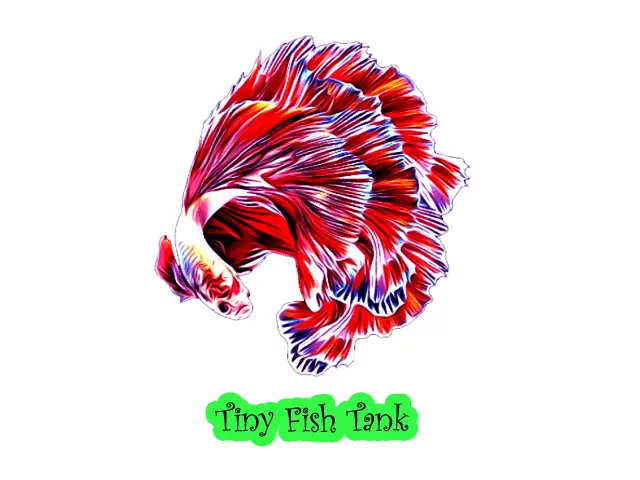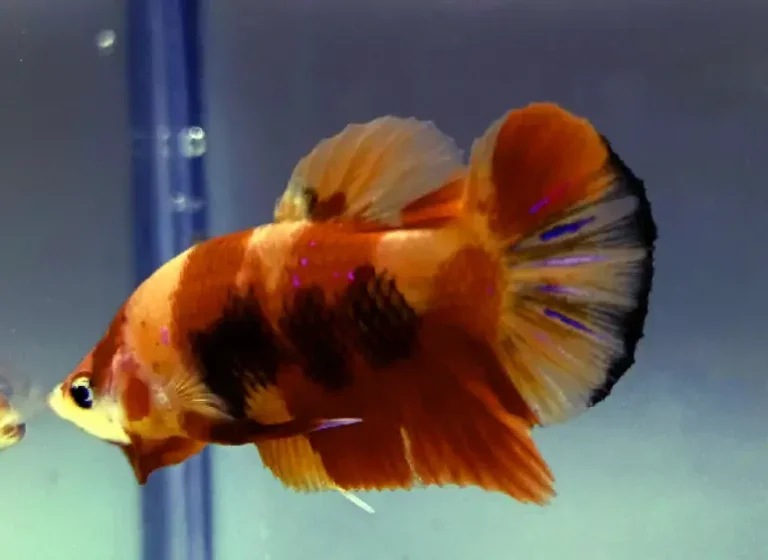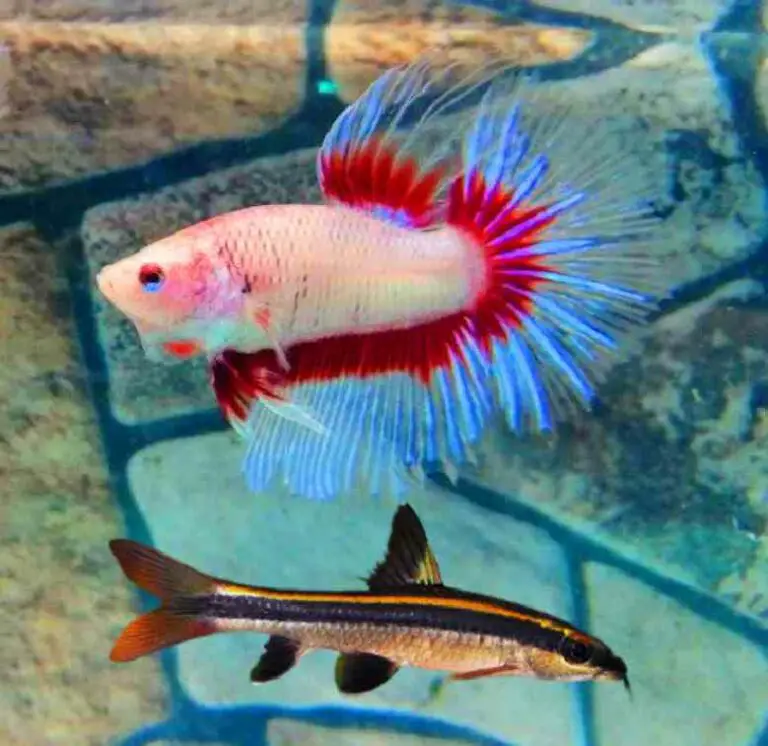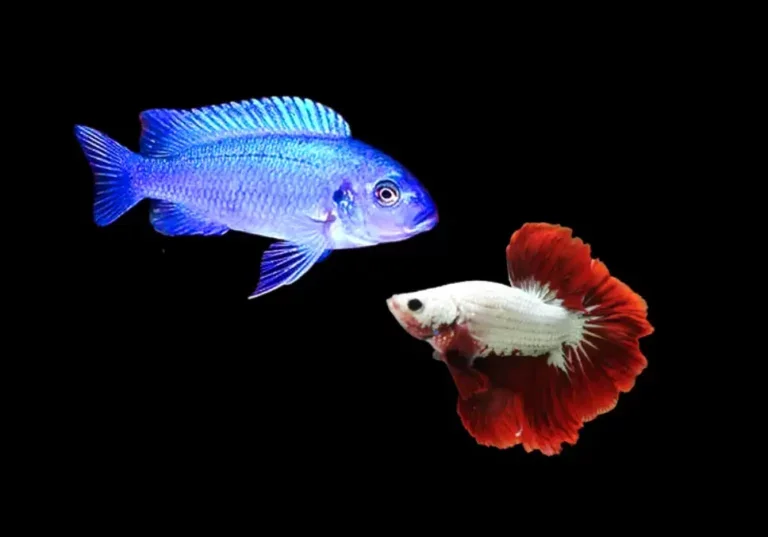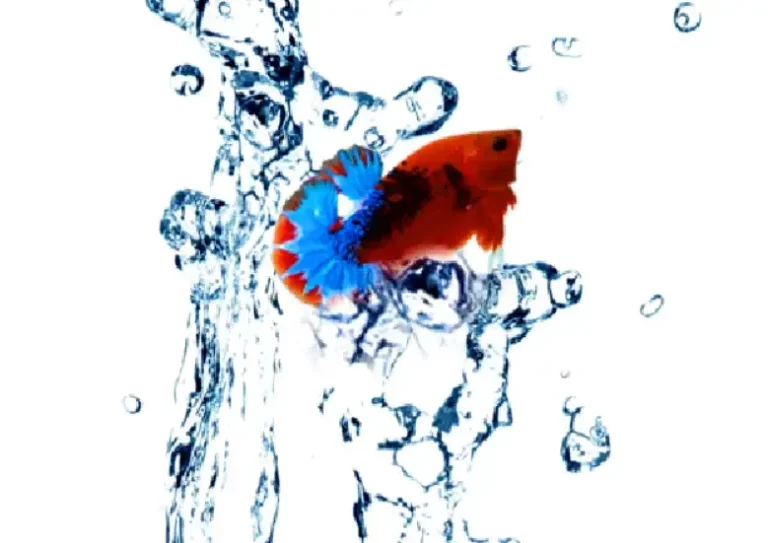Why is Betta Fish Swimming Erratically? [7 Reasons & Answers]
A Betta displaying erratic swimming behavior can be a sign of poor water quality or an underlying health issue.
It is essential to regularly maintain the tank and monitor the fish’s health to ensure their optimal well-being and enjoyment for both the owner and the fish.
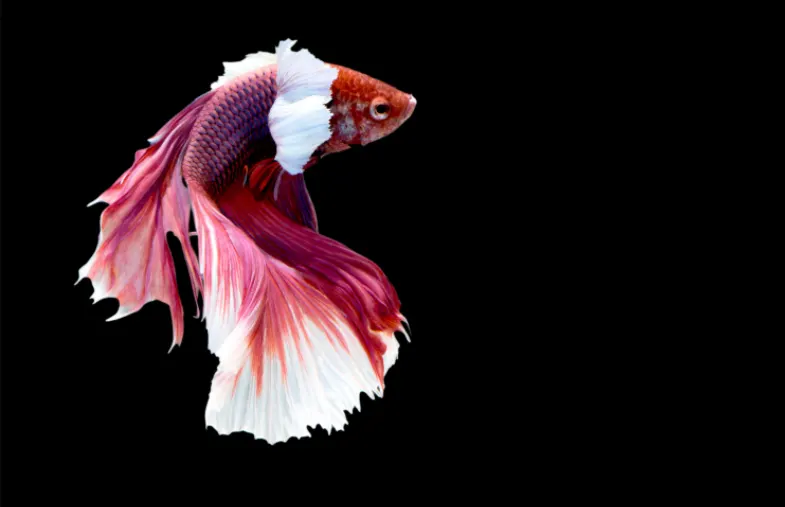
Table of Contents
- Lack of Oxygen Level
- Bad Water Quality
- Low-Quality nutrition feed
- Parasites infection
- Betta’s poor eye vision
- Swim Bladder Disease
- Betta fish with stress
Lack of Oxygen Level
Various factors can cause erratic swimming behavior in Bettas, but one of the most common is a lack of oxygen, also known as hypoxia. Bettas require a minimum dissolved oxygen level of 5 ppm to survive.
When oxygen levels are low, the fish often try to reach the tank’s surface for oxygen. Many factors, including high water temperature, can cause this behavior.
Bettas are tropical fish and prefer water temperatures between 76-82 degrees Fahrenheit, as temperatures above 84 degrees Fahrenheit can lead to decreased oxygen levels in the water.
High ammonia and nitrite levels can also decrease the amount of dissolved oxygen in the water. To prevent hypoxia, it is essential to regularly monitor the water temperature, pH level, and levels of ammonia and nitrite to ensure optimal oxygen levels for your Betta fish.
Bad Water Quality
As you know, poor water quality can significantly impact the health and behavior of your Betta fish. The pH level is one of the most important factors to consider when maintaining water quality. Bettas thrive in water with a pH level between 6.5-7.5.
If the pH level is too high or too low, it can cause stress to the fish, leading to a change in behavior. Additionally, you need to monitor the ammonia, nitrite, and nitrate levels in the water, as high ammonia levels can be toxic to Bettas and lead to poisoning.
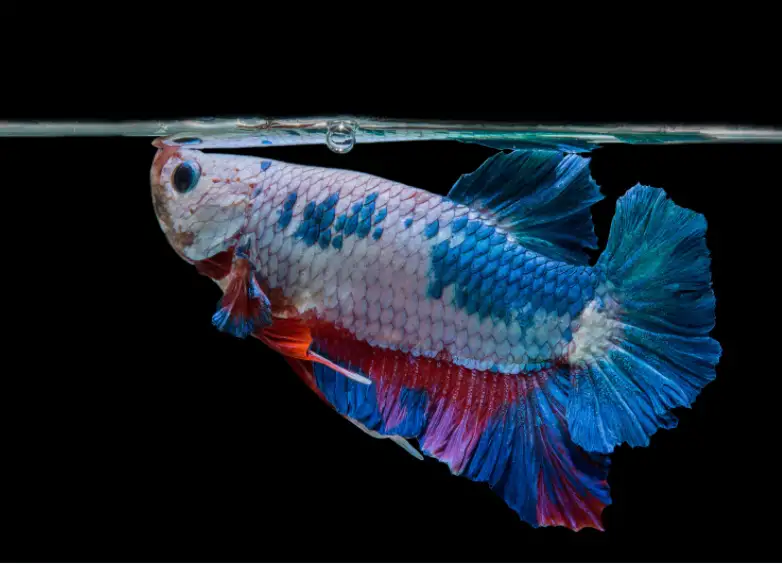
Ammonia is toxic to fish at levels of 0.25 ppm or above. Nitrite levels should be kept at 0 ppm, and nitrate levels should be under 40 ppm. Regular water changes, using a high-quality water conditioner, and testing the water can help you maintain the ideal water quality for your Betta fish.
Low-Quality nutrition feed
Bettas are carnivorous fish and require a protein-rich diet to maintain optimal health. Poor nutrition can result in various health issues, including erratic swimming behavior.
A Betta’s swimming capability is closely linked to its overall health and well-being, and a lack of essential nutrients can negatively impact this behavior. Inadequate nutrition can lead to other health problems, such as weight gain, organ damage, and decreased immunity.
Ensure a balanced diet to feed your Betta, and it is essential to provide a variety of protein-rich foods such as brine shrimp, bloodworms, and daphnia.
| Food Type | Protein (g) | Fat (g) | Carbohydrates (g) | Fiber (g) |
| Brine shrimp | 19 | 2 | 1 | 0 |
| Bloodworms | 12 | 1 | 3 | 0 |
| Daphnia | 15 | 2 | 5 | 1 |
| Pellets | 40 | 6 | 20 | 2 |
| Freeze-dried krill | 22 | 4 | 4 | 1 |
| Freeze-dried plankton | 18 | 3 | 5 | 1 |
Amounts to Feed:
- Brine shrimp: 2-3 pieces, 2-3 times per week
- Bloodworms: 2-3 pieces, 2-3 times per week
- Daphnia: 2-3 pieces, 2-3 times per week
- Pellets: 2-3 pellets, 2-3 times per week
- Freeze-dried krill: 2-3 pieces, 2-3 times per week
- Freeze-dried plankton: 2-3 pieces, 2-3 times per week
Feeding your Betta too much can also cause problems, such as overeating and weight gain, so it is essential to provide a balanced diet that meets the fish’s nutritional needs without overfeeding.
Keep in your mind; A varied diet that includes live and frozen foods and high-quality pellets can ensure that your Betta receives all the necessary nutrients for a healthy and active lifestyle.
Parasites infection
If you notice your Betta fish rubbing against decorations or the sides of the tank, it could indicate a parasite infestation. Parasites such as ich and velvet can cause itching and discomfort, leading to the fish attempting to scratch itself.
These parasites can be difficult to see with the naked eye, but other signs of infestation include white spots on the fish’s skin or fins, clamped fins, and general lethargy.
Another type of parasite that can cause similar behavior is worm-like parasites, such as skin or gill flukes. These parasites can cause irritation and discomfort, leading to the fish rubbing against objects in the tank.
These parasites can also affect the color of the fish, making it appear faded or dull. It is essential to be vigilant, keep an eye out for any signs of parasitic infestation, and consult a veterinarian for proper diagnosis and treatment.
Regularly cleaning and maintaining the tank and quarantining new fish can also help prevent the spread of parasites in your aquarium.
Read More About :- Betta fish Ich / White Spot Diseases
Betta’s poor eye vision
Vision problems can also cause erratic swimming behavior in Bettas. Poor vision can result from various factors, including age, disease, and injury.
As your Bettas age, their eyesight can deteriorate, leading to difficulty navigating the tank and increased swimming behavior. A common eye condition in Bettas is Popeye, caused by a bacterial or viral infection that leads to the fish’s eyes bulging out of its head.
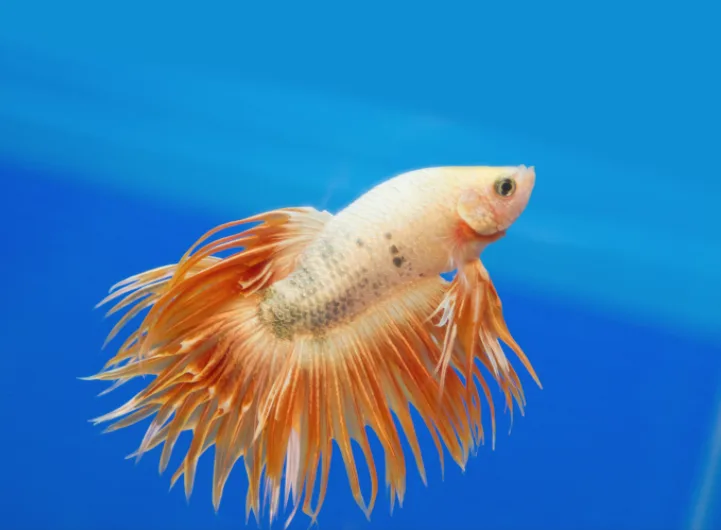
Various issues, such as bacterial or fungal infections, poor water quality, or nutritional deficiencies, can also cause cloudy eyes.
If age is not the issue, it is essential to consult with a veterinarian or a professional fish specialist to determine the underlying cause of the problem and receive proper treatment.
A veterinarian can thoroughly examine the fish, including an eye exam, to diagnose the problem and provide appropriate treatment options.
tiny fish tank
Sometimes, medical treatment may be required to clear up the infection and restore the fish’s vision. In addition, maintaining optimal water conditions, providing a balanced diet, and regularly monitoring the fish’s health can help prevent vision problems in Bettas.
Swim Bladder Disease
Another form of erratic swimming behavior in Bettas is when the fish is swimming upside down. This can be a sign of swim-bladder disease, which affects the fish’s ability to control its buoyancy.
The swim bladder is an organ in the fish’s abdomen that regulates the air that goes in and out, allowing the fish to control its buoyancy and swim efficiently.
When this organ is damaged or malfunctioning, the fish can struggle to maintain its position in the water, leading to an upside-down swimming position.
Various factors, including injury, infection, genetic predisposition, and poor nutrition, can cause swim-bladder disease. High-fat or high-carbohydrate foods can cause the fish to have a distended belly, making it difficult for the fish to swim.
Other symptoms of swim-bladder disease include a swollen belly, difficulty swimming, and difficulty staying upright. If you suspect that your Betta has swim-bladder disease, it is essential to consult with a veterinarian or a professional fish specialist for proper diagnosis and treatment.
In some cases, medical treatment may be required to clear up the infection or restore the fish’s ability to regulate its buoyancy.
In addition, maintaining optimal water conditions, providing a balanced diet, and regularly monitoring the fish’s health can help prevent swim-bladder disease in Bettas.
Betta fish with stress
Erratic swimming behavior in Bettas can also be caused by stress. Various factors, including a change in environment, poor water quality, and the presence of other aggressive fish, can cause stress.
As you know, Bettas are highly territorial fish, and a new environment can cause them to feel stressed, leading to changes in behavior, such as erratic swimming. Stress in fish can also lead to other health problems, such as decreased immunity, weight loss, and increased susceptibility to disease.
It is essential to be mindful of the fish’s behavior during the first few days in a new environment and monitor the fish for signs of stress.
Suppose the fish does not appear to adjust to the new environment after a few days. In that case, it is essential to consult with a veterinarian or a professional fish specialist for proper diagnosis and treatment.
Stress can be reduced by providing a comfortable and suitable environment, maintaining optimal water conditions, and avoiding overcrowding.
In addition, providing a varied diet, regular water changes, and keeping the tank clean can also help reduce stress and promote overall well-being.
Read More About :- https://www.tinyfishtank.com/can-a-betta-recover-from-ammonia-poisoning/
